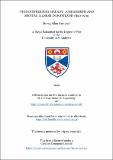Files in this item
‘This distressing malady’ : childbirth and mental illness in Scotland 1820 – 1930
Item metadata
| dc.contributor.advisor | Fyfe, Aileen | |
| dc.contributor.advisor | Easterby-Smith, Sarah | |
| dc.contributor.author | Campbell, Morag Allan | |
| dc.coverage.spatial | xviii, 344 p. | en_US |
| dc.date.accessioned | 2020-02-26T10:55:42Z | |
| dc.date.available | 2020-02-26T10:55:42Z | |
| dc.date.issued | 2020-06-25 | |
| dc.identifier.uri | https://hdl.handle.net/10023/19534 | |
| dc.description.abstract | My thesis explores the experiences of women who suffered from mental disorder related to childbirth and pregnancy, looking in particular at Dundee, Fife and Forfarshire in the north-east of Scotland, during the period 1820 to 1930. This study offers a new perspective on women’s lives, wellbeing and healthcare in this region by examining at a local level the ideas surrounding postpartum mental illness. By the mid-nineteenth century, the term ‘puerperal insanity’ was widely known and much discussed and deliberated in medical literature. However, the day-to-day care and treatment of postpartum women suffering from mental disorder was not straightforward. My findings demonstrate that the diagnosis and treatment of postpartum mental illness in nineteenth- and early twentieth-century Scotland was a complex issue influenced as much by social and economic factors as by medical ideas. Using records from the chartered asylums at Montrose and Dundee, court and prison records, and newspaper accounts, I have uncovered how childbearing-related mental illness was recognised, accepted and supported by families, neighbours, friends and authorities. Within the asylum, I have revealed how physicians assessed their patients’ characters and status as much as their physical conditions, but nevertheless in many cases provided positive medical care and much-needed rest and nourishment. In criminal cases, my study has looked beyond legislation and verdicts to reveal a positive and constructive approach to the care and custody of women who had committed child murder. Awareness of postpartum mental illness in the community was developed through a collaboration of medical and lay knowledge, acquired through interactions between physicians, families and communities, and filtered through pre-existing understandings and ideas. I have identified a lay understanding and accepted discourse which guided the ideas and actions of friends, family and community in dealing with the problems associated with mental illness among postpartum women. | en_US |
| dc.language.iso | en | en_US |
| dc.publisher | University of St Andrews | en |
| dc.rights | Creative Commons Attribution-NonCommercial-NoDerivatives 4.0 International | * |
| dc.rights.uri | http://creativecommons.org/licenses/by-nc-nd/4.0/ | * |
| dc.subject | Scotland | en_US |
| dc.subject | 19th century | en_US |
| dc.subject | Early 20th century | en_US |
| dc.subject | Mental health | en_US |
| dc.subject | Women's health | en_US |
| dc.subject | Asylums | en_US |
| dc.subject | Women's healthcare | en_US |
| dc.subject | Postpartum mental health | en_US |
| dc.subject | Puerperal insanity | en_US |
| dc.subject | Motherhood | en_US |
| dc.subject | Child murder | en_US |
| dc.subject | Institutional care | en_US |
| dc.subject | Communities | en_US |
| dc.subject.lcc | RG588.C2 | |
| dc.subject.lcsh | Women--Mental health--Scotland--History--19th century | en |
| dc.subject.lcsh | Women--Mental health--Scotland--History--20th century | en |
| dc.subject.lcsh | Women--Institutional care--Scotland | en |
| dc.subject.lcsh | Postpartum psychiatric disorders--Scotland | en |
| dc.subject.lcsh | Mental illness in pregnancy | en |
| dc.subject.lcsh | Motherhood--Scotland--History--19th century | en |
| dc.subject.lcsh | Motherhood--Scotland--History--20th century | en |
| dc.title | ‘This distressing malady’ : childbirth and mental illness in Scotland 1820 – 1930 | en_US |
| dc.type | Thesis | en_US |
| dc.contributor.sponsor | Strathmartine Trust (Great Britain) | en_US |
| dc.type.qualificationlevel | Doctoral | en_US |
| dc.type.qualificationname | PhD Doctor of Philosophy | en_US |
| dc.publisher.institution | The University of St Andrews | en_US |
| dc.publisher.department | Institute of Scottish Historical Research | en_US |
| dc.identifier.doi | https://doi.org/10.17630/10023-19534 |
The following licence files are associated with this item:
This item appears in the following Collection(s)
Except where otherwise noted within the work, this item's licence for re-use is described as Creative Commons Attribution-NonCommercial-NoDerivatives 4.0 International
Items in the St Andrews Research Repository are protected by copyright, with all rights reserved, unless otherwise indicated.


